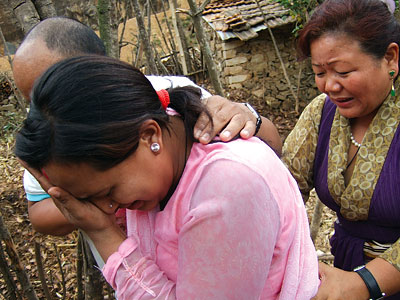 BITTERSWEET: In Katha Mitho Sarangiko Phurwa returns home after being rescued from a brothel |
A man is kidnapped; he's beaten up, tortured even. He's released. When he returns home, he is welcomed by his family, not least by a tearful and grateful wife.
A woman is abducted. She is forced to work as a sex worker in a brothel in India. Eventually she is rescued and released from her hell. She goes back to Nepal and �she is punished all over again. Her family rejects her as tainted; she cannot go back to the village; she cannot find a husband. Her only hope lies in the refuge of an NGO, or in reinventing herself somewhere else.
Let's return to the scene of the crime. The man has a head wound, he may even have sustained a fracture or two. The woman has bruised thighs, her hymen is torn and there are abrasions to her vagina, and maybe she also has an infection incurred through her ordeal in the brothel.
We have two injured people, but the man's physical trauma is seen as an unfortunate by-product of the crime; it's a private condition. The woman's physical trauma, by contrast, stigmatises her for life. It begs the question: who owns a woman's body?
At the BBC World Service Trust, we are making a five-part drama on the trafficking of women, Katha Mitho Sarangiko. The main character is played by a former sex worker � a beautiful, sad, tense woman, who gives a heart-rending performance as Phurwa, a victim of trafficking. When producer Khagendra Lamichhane asked her if she was married, she gave him a bleak, bitter look and said: "Who would have me now?"
Why is this so? Part of the answer lies with virginity, the jewel that society prizes. It is a prize few women have control over, as it is often common property, the bargaining chip in a complex web of negotiations involving fathers, brothers and families. The issue of male virginity is largely irrelevant, but a woman's virginity signals moral order in society.
In many societies female sexuality is seen as a hidden, malignant force that needs to be controlled. Fail to keep it in check, and untold harm may ensue. As the Laws of Manu declare: 'It is the very nature of women to corrupt men here on earth; for that reason, circumspect men do not get careless and wanton among wanton women.' (Chapter 2, para 213)
The fear that women will bring misfortune to men though their sexual wiles, or even by their mere presence, is deep-rooted. In Sarangiko Bhalakusari, companion programme to Katha Mitho Sarangiko, Bhanu Bokhim interviews writer Chetnatha Acharya about his experience of marrying a widow deemed culpable when her first marriage ended in tragedy, with a bus accident that killed everyone in the wedding procession except the bride.
Chetnatha navigated the sea of ill will and married this woman, his family welcomed her. But in the village close to where the accident happened, people fabricated their own sequel in which the woman became betrothed to a second man and the same thing happened. It is as if in every woman lurks the witch. The widow is doubly suspect: she is sexually experienced, but has lost her husband, the owner of her body. Who can control her now? She must be ostracised.
A woman's body is flesh and blood, just like a man's. Her wounds are as significant or insignificant as a man's. Her body should be hers to squander or nurture as she pleases. But to accept this has serious implications. It means re-evaluating her crucial position � akin to a keystone � in the architecture of society's moral order.
Who can share the burden of society's morality with her? We should perhaps ask her gatekeepers: her brothers, father, family, and community, to share that responsibility, and renounce the urge to see a woman as a scapegoat.
In our story this week, Phurwa, a former sex worker, is redeemed by the love of her parents and that of an honest man, Chandre. A fairytale ending, but one that in the real world is all too rare.
Katha Mitho Sarangiko plays on 103 Mhz on Fridays at 8.15pm, and Sarangiko Bhalakusari on Saturdays at 8.15pm, in the Kathmandu Valley.
READ ALSO:
Phoenix rising, Rupa Joshi
Who's watching?, Indu Nepal
Dishing it out


